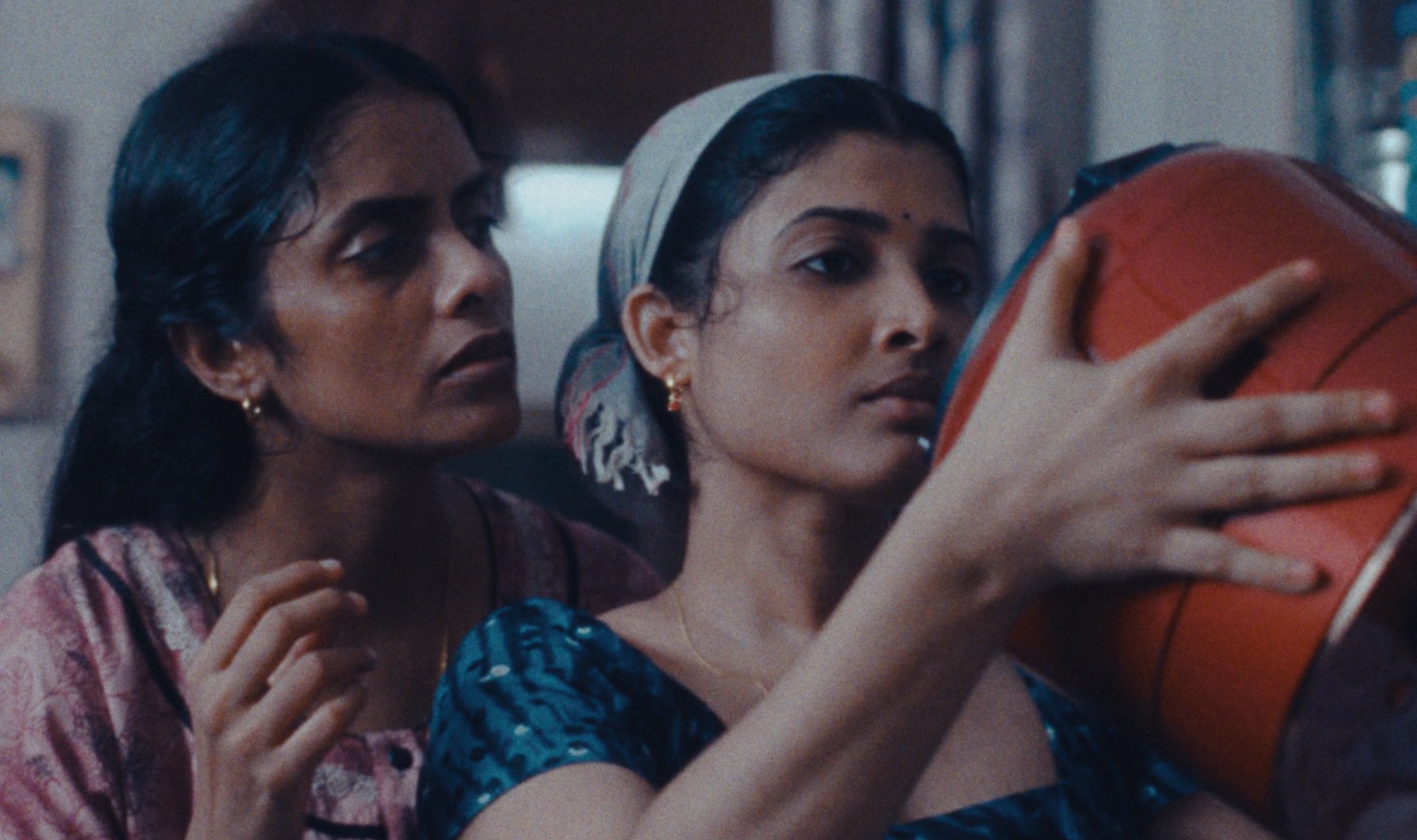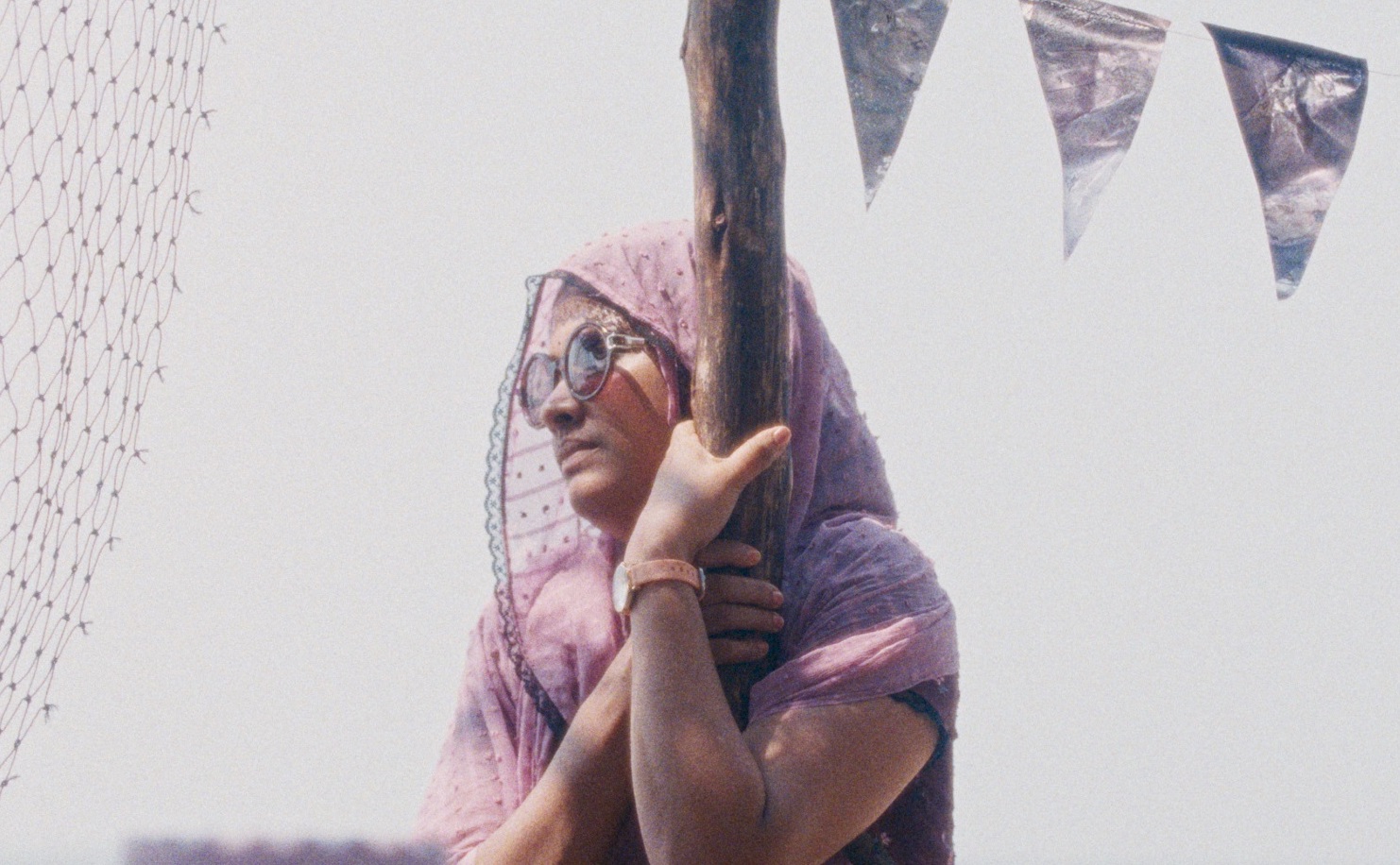All We Imagine as Light review - tender portrait of three women struggling to survive in modern Mumbai | reviews, news & interviews
All We Imagine as Light review - tender portrait of three women struggling to survive in modern Mumbai
All We Imagine as Light review - tender portrait of three women struggling to survive in modern Mumbai
Payal Kapadia's debut feature is delicate, beautifully acted and visually striking

The Indian writer-director Payal Kapadia scored this year’s Cannes Grand Prix with her first fiction film, All We Imagine as Light, which follows three women trying to make a living in modern Mumbai. It’s a deserving winner, both exquisitely delicate and formally bold.
Two of the women are nurses, colleagues at a specialist maternity unit, the third an older cook at their clinic, Parvaty (Chhaya Kadam), the only one who has had a child. Anu (Divya Prabha, pictured below, with Kani Kusruti), the youngest, is a lively young woman on the verge of a sexual liaison with a young tousle-headed Muslim man, Shiaz (Hridu Haroon). She shares a bedroom with Prabha (Kani Kusruti), a married woman whose husband moved away to work in a factory in Germany and hasn’t contacted her for over a year.
Before we start delving into the women’s lives, Kapadia’s camera takes us on a trawl of Mumbai’s streets, where people hawk goods by the side of the road, rush in vast hordes down the street, cram themselves into buses. The camera travels at the speed of a bus, taking in the multitudes without stopping, in a way that suggests the fast pace of life in Mumbai and the high volume of people living cheek by jowl there. In voiceovers we hear the views of actual locals, bemoaning the lack of anywhere to live, the shortage of good jobs anywhere else, the high cost of living in the city, but also the excitement it can bring, the way time passes swiftly there.
On one packed bus, where a woman is calmly shelling beans, suddenly and seamlessly we are focusing on Prabha as she travels to work, her big dark eyes taking in everything around her without any apparent reaction. She’s a calm presence, though not a serene one. It becomes clear she is a linchpin for her co-workers, the one who sorts out difficult patients like the old woman haunted by her dead husband, who appears to her, now legless but still giving off the familiar odour of his tobacco. Prabha helps Partavy find legal advice, keeps a sisterly eye on Anu, teaches a migrant doctor Hindi and even, when a pregnant cat takes up residence in a box outside her flat, gets this doctor to give it an ultrasound scan at the clinic.
This is a tender study of the trials of women in a social order that doesn’t recognise them as equal to men. It’s neither sentimental nor strident and goes about digging into its material with the same resolve with which the women tackle their problems. Anu, with modern ideas but traditional parents, is facing an arranged marriage; Prabha is struggling with the absence of her partner, unable to reach out to anybody else (her doctor friend clearly is attracted to her); Parvaty is a widow facing eviction from her home of 22 years, which developers want to demolish to build “prestige” flats. A graphic of the development’s ideal tenants, young and beautiful, on the hoarding outside signals brutally that these homes are not designed to be affordable for people like her.  Through this cross-generational trio, we can see the tight parameters of their world. Saddled with menfolk who won’t get vasectomies; confined to lowly, often unpleasant roles in the workplace hierarchy, always needing to be deferential to the inevitably male doctors; trapped in loveless marriages or rendered invisible in widowhood. As if a signal from an alien, “international” world, a German-made electric rice cooker arrives anonymously for Prabha, one of the oddest of possible love tokens; even odder, and sadder, is her reaction to it, when, sleepless one night, she gets it out of its box and cradles it between her legs, like a loved one. Her doctor friend is pressing for a relationship, but she is stuck in a phantom marriage.
Through this cross-generational trio, we can see the tight parameters of their world. Saddled with menfolk who won’t get vasectomies; confined to lowly, often unpleasant roles in the workplace hierarchy, always needing to be deferential to the inevitably male doctors; trapped in loveless marriages or rendered invisible in widowhood. As if a signal from an alien, “international” world, a German-made electric rice cooker arrives anonymously for Prabha, one of the oddest of possible love tokens; even odder, and sadder, is her reaction to it, when, sleepless one night, she gets it out of its box and cradles it between her legs, like a loved one. Her doctor friend is pressing for a relationship, but she is stuck in a phantom marriage.
Anu has reached her own dead end, exemplified by the gallery of would-be husbands from a dating app in prospect for her, a quietly comical parade of smug BS merchants, reeking of entitlement. She is so devoted to Shiaz, she is prepared to buy herself a burqa and attend a family wedding with him. Unluckiest of all, Parvaty discovers she doesn’t legally exist and needs papers of her dead husband’s to prove her tenancy. Despite sitting on a mountain of trash opening boxes and cases, she can’t find any; meanwhile, the developers cut off her electricity and build ever higher. She and the increasingly politically aware Prabha show their growing discontent with the status quo in a satisfyingly concrete way, startled by their own audacity. Then the film suddenly pulls out unexpected stops and sends its characters on a detour. The catalyst for this is Parvaty's decision to go back to her coastal village south of Mumbai, to live in a crude shack and work as a cook. The other two women go with her, trailed by Anu’s boyfriend. The village is an anti-Mumbai, a quiet world of fishermen where the residents look out at a vast empty ocean. Whereas Mumbai is a city of illusions that its residents must embrace to survive, the village gives the women space to breathe, drink, dance and dream. Prabha has a literal dream after helping to treat a sailor who gets washed up on the shore, a scene that develops into a fantasy sequence expressive of all her pent-up emotions.
Then the film suddenly pulls out unexpected stops and sends its characters on a detour. The catalyst for this is Parvaty's decision to go back to her coastal village south of Mumbai, to live in a crude shack and work as a cook. The other two women go with her, trailed by Anu’s boyfriend. The village is an anti-Mumbai, a quiet world of fishermen where the residents look out at a vast empty ocean. Whereas Mumbai is a city of illusions that its residents must embrace to survive, the village gives the women space to breathe, drink, dance and dream. Prabha has a literal dream after helping to treat a sailor who gets washed up on the shore, a scene that develops into a fantasy sequence expressive of all her pent-up emotions.
It’s not an epic epiphany but still significant by her restrained standards. Kapadia leaves her and the other women’s fates unresolved, though the final image suggests they are in an idyll, lit by fairy-lights, that is a corrective to the rat race of their city lives — but is its magic sustainable? Can Anu (pictured above) find the resilience to dodge her threatened arranged marriage? Should she? Can Prabha’s growing union activism bring vital change to women’s lives? How can unfortunates like Parvaty stop powerful economic forces from steamrollering her life? Kapadia works by indirection, gently moving the characters through scenarios without overtly editorialising. She seems fully aware of Mumbai’s downsides but also of its possibilities. It’s a tender and absorbing, beautifully acted and sensitively directed debut.
- More film reviews on theartsdesk
The future of Arts Journalism
You can stop theartsdesk.com closing!
We urgently need financing to survive. Our fundraising drive has thus far raised £49,000 but we need to reach £100,000 or we will be forced to close. Please contribute here: https://gofund.me/c3f6033d
And if you can forward this information to anyone who might assist, we’d be grateful.

Subscribe to theartsdesk.com
Thank you for continuing to read our work on theartsdesk.com. For unlimited access to every article in its entirety, including our archive of more than 15,000 pieces, we're asking for £5 per month or £40 per year. We feel it's a very good deal, and hope you do too.
To take a subscription now simply click here.
And if you're looking for that extra gift for a friend or family member, why not treat them to a theartsdesk.com gift subscription?
more Film
 Steve review - educator in crisis
Cillian Murphy excels as a troubled headmaster working with delinquent boys
Steve review - educator in crisis
Cillian Murphy excels as a troubled headmaster working with delinquent boys
 Can I get a Witness? review - time to die before you get old
Ann Marie Fleming directs Sandra Oh in dystopian fantasy that fails to ignite
Can I get a Witness? review - time to die before you get old
Ann Marie Fleming directs Sandra Oh in dystopian fantasy that fails to ignite
 Happyend review - the kids are never alright
In this futuristic blackboard jungle everything is a bit too manicured
Happyend review - the kids are never alright
In this futuristic blackboard jungle everything is a bit too manicured
 Robert Redford (1936-2025)
The star was more admired within the screen trade than by the critics
Robert Redford (1936-2025)
The star was more admired within the screen trade than by the critics
 Blu-ray: The Sons of Great Bear
DEFA's first 'Red Western': a revisionist take on colonial expansion
Blu-ray: The Sons of Great Bear
DEFA's first 'Red Western': a revisionist take on colonial expansion
 Spinal Tap II: The End Continues review - comedy rock band fails to revive past glories
Belated satirical sequel runs out of gas
Spinal Tap II: The End Continues review - comedy rock band fails to revive past glories
Belated satirical sequel runs out of gas
 Downton Abbey: The Grand Finale review - an attemptedly elegiac final chapter haunted by its past
Noel Coward is a welcome visitor to the insular world of the hit series
Downton Abbey: The Grand Finale review - an attemptedly elegiac final chapter haunted by its past
Noel Coward is a welcome visitor to the insular world of the hit series
 Islands review - sunshine noir serves an ace
Sam Riley is the holiday resort tennis pro in over his head
Islands review - sunshine noir serves an ace
Sam Riley is the holiday resort tennis pro in over his head
 theartsdesk Q&A: actor Sam Riley on playing a washed-up loner in the thriller 'Islands'
The actor discusses his love of self-destructive characters and the problem with fame
theartsdesk Q&A: actor Sam Riley on playing a washed-up loner in the thriller 'Islands'
The actor discusses his love of self-destructive characters and the problem with fame
 Honey Don’t! review - film noir in the bright sun
A Coen brother with a blood-simple gumshoe caper
Honey Don’t! review - film noir in the bright sun
A Coen brother with a blood-simple gumshoe caper
 The Courageous review - Ophélia Kolb excels as a single mother on the edge
Jasmin Gordon's directorial debut features strong performances but leaves too much unexplained
The Courageous review - Ophélia Kolb excels as a single mother on the edge
Jasmin Gordon's directorial debut features strong performances but leaves too much unexplained

Add comment